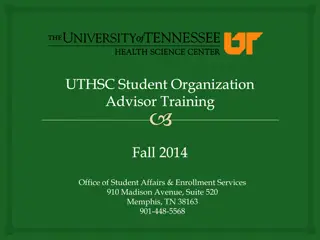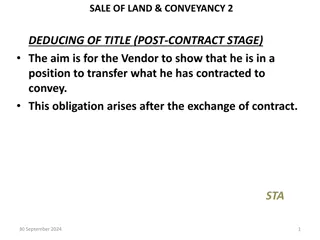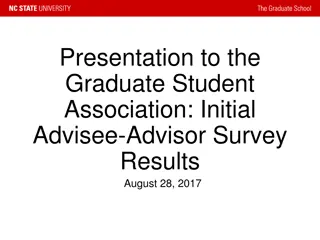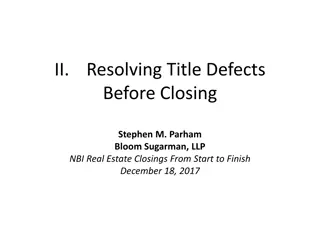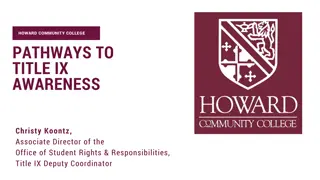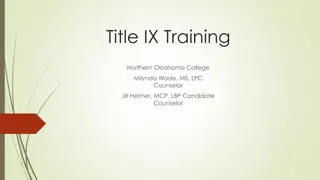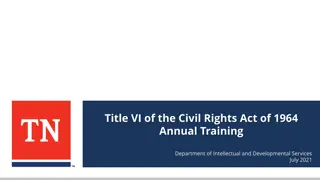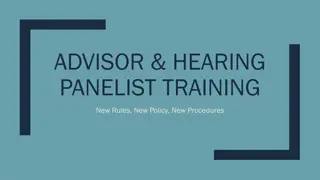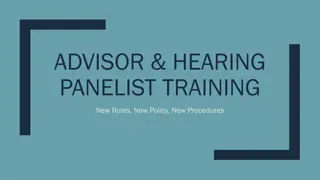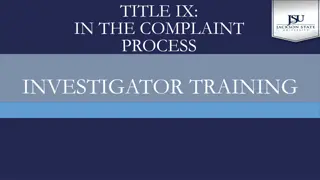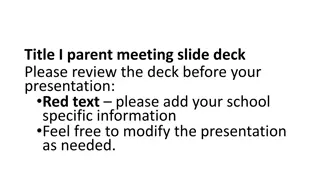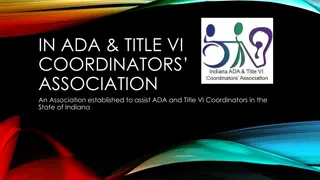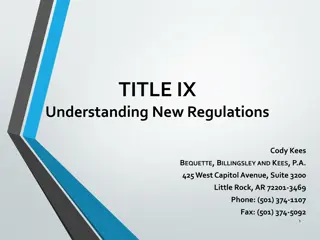Title IX Advisor Training Overview
The presentation provides insights into the role of advisors in the Title IX process following the new rules released by the U.S. Department of Education in May 2020. Advisors play a crucial part in assisting parties during live disciplinary hearings in cases of sexual misconduct, ensuring due process, and maintaining a gender-neutral and unbiased approach. Key aspects discussed include advisor selection, responsibilities, due process requirements, and understanding sexual harassment under Title IX.
Download Presentation

Please find below an Image/Link to download the presentation.
The content on the website is provided AS IS for your information and personal use only. It may not be sold, licensed, or shared on other websites without obtaining consent from the author. Download presentation by click this link. If you encounter any issues during the download, it is possible that the publisher has removed the file from their server.
E N D
Presentation Transcript
Title IX Advisor Training: Part I Josh McKoon General Counsel
Title IX Changes On May 6, 2020, the U.S. Department of Education released Title IX rules on sexual harassment. This represents the first full rulemaking on a major Title IX issue since 1975 and the only one dedicated to sexual harassment. This presentation will cover the role of the advisor in the Title IX process.
Role of the Advisor Under the new rules, postsecondary institutions must hold live disciplinary hearings in sexual misconduct cases and allow cross-examination of witnesses. These hearings are quasi-judicial proceedings with certain due process guarantees similar to a criminal trial. Additionally, this process eliminates the single investigator model insofar as no decision-maker be the same person who serves as the Title IX Coordinator or investigator (1247). As part of this new process, each party is required to have an advisor to assist them, provide advice, and question witnesses during the live hearing. An advisor may be an attorney, but that is not a requirement to serve in the advisor role.
Role of the Advisor (Contd) The advisor may be selected by the party without any intervention from the college. However, if the party is not able to select an advisor, the college is under an obligation to provide an advisor. The advisor may be involved from the initial filing of the complaint, but only has a specifically defined role at the live hearing. The advisor will need to meet with the party and become familiar with their concerns regarding the matter. The advisor will need to carefully review the investigator s report and any supporting evidence to prepare for the live hearing. During the live hearing, the advisor must be prepared to cross-examine witnesses who provided testimony to the investigator. Therefore it will be important for advisors to understand how to examine witnesses as well as the standard used to meet the burden of proof and the application of relevant evidence.
Other Due Process Requirements All sexual harassment rules and training must be gender neutral and free of any sex bias or sex stereotyping. Investigators and decision-makers are prohibited from drawing conclusions about credibility based on a party s status (809). When an investigation begins, the parties must be given a written explanation of the allegations with sufficient details known at the time and with sufficient time to prepare a response before any initial interview. At least ten (10) days before the hearing, both parties must receive a written report that fairly summarizes the relevant evidence.
Understanding What Is Sexual Harassment Under Title IX First, any form of quid pro quo harassment that is, conditioning any educational opportunity or benefit on the granting of sexual favors constitutes a per se violation of Title IX, regardless of its severity or pervasiveness. Quid pro quo harassment constitutes conduct without any constitutional protection. Second, the final version of the regulations added the proviso that any form of sexual assault, dating violence, domestic violence, or stalking as defined by the Clery Act constitutes sexual harassment. These forms of misconduct are so serious in themselves that no finding of pervasiveness is required. Third, to violate Title IX, all other forms of unwelcome conduct must be so serious, pervasive, and objectively offensive that it effectively denies a person equal access to an educational program.
Understanding Title IX Jurisdiction of Colleges Now the phrase education program or activity includes locations, events, or circumstances over which the recipient exercised substantial control over both the respondent and the context in which the harassment occurs as well as any building owned or controlled by a student organization that is officially recognized by a postsecondary institution. This narrows the application of Title IX considerably from current practice. Finally, the new rules establish that Title IX jurisdiction only exists within the United States so that a college could not offer Title IX procedures for a study abroad program for example.
Burden of Proof The advisor must understand the application of the relevant burden of proof to any complaint in order to determine how best to represent the party s interests. The burden of proof is the standard a party must satisfy to establish a fact. There are two standards available under the Title IX rules: preponderance of the evidence or clear and convincing evidence. Under the preponderance of the evidence standard, the burden of proof is met when the party with the burden convinces the finder of fact that there is a greater than 50% chance that the claim is true. Under the clear and convincing evidence standard, the fact finder must be convinced that the evidence is highly and substantially more likely to be true than untrue.
Determining What Is Relevant Evidence Only relevant questions may be asked of a party or witness. The advisor must limit questions asked to those that will elicit relevant evidence, otherwise the question will not be allowed by the decision-maker. Relevant evidence is generally understood to be evidence that has any tendency to make a fact more or less probable than it would be without the evidence and the fact in question is of consequence in determining the action.
Understanding Rape Shield Provisions of Title IX Rules The advisor must insure that questions asked about prior sexual behavior are considered relevant. The decision-maker will deem irrelevant questions and evidence about a complainant s prior sexual behavior unless offered to prove that someone other than the respondent committed the alleged misconduct or the question/evidence is offered to prove consent so that must be kept in mind if questions on this subject are asked.
What is Cross-Examination? Cross-examination is the greatest legal engine ever invented for the discovery of truth. John H. Wigmore as quoted in Lilly v. Virginia, 527 U.S. 116 (1999). Cross-examination has been defined in Merriam-Webster as, the examination of a witness who has already testified in order to check or discredit the witness s testimony, knowledge, or credibility. For our purposes, the direct testimony will be given before the live hearing to the investigator. You will review it in the report issued by the investigator. So at the live hearing, you will, on behalf of the party you are representing, be challenging witness testimony by posing questions of the witness.
Elements of Cross-Examination You should prepare an outline for witnesses spelling out the facts you want to cover. It is important for you to ask succinct questions that usually have yes or no answers. (i.e. don t ask What are you wearing? but do ask You are wearing a red shirt today, aren t you? ) Your objective should be to conduct an examination that may be easily followed by the decision- maker. Each question should just establish a single fact do not ask compound questions. As you pose questions you should avoid characterizations and conclusions. If the witness does not give a definitive yes or no answer to your question, you should continue to focus on the fact you are attempting to establish until you get the answer you are seeking. Impeachment of witnesses may be a necessary element to cross examination. This is when you find contradictions in the witness testimony that could raise a question as to the credibility of the witness.
Pointers for Cross-Examination Be patient. It is natural to want to get the examination over with as quickly as possible. However you need to focus on the outline you have created and insure you carefully cover each and every fact you have deemed relevant for the decision-maker to hear. Be respectful but determined. You should treat each witness with respect, but at the same time make sure you are persistent in establishing the facts that are important to the case for the party you are representing. Remember your audience. The questions you are asking are not for the benefit of the party sitting with you, or for the other party or advisor, or even the witness. You are asking these questions to establish facts that the decision-maker needs to help make it easy to decide the matter.
The Determination and Appeal Once the live hearing is concluded, the decision-maker will deliberate and issue a written determination. This determination will include findings of fact, rationale for the decision, and instructions on how to appeal. In your role as advisor, you will likely be called upon to help the party review the determination to understand it and may be asked about the appeals process. You will need to be prepared to understand how to read the determination and to answer questions about it and the potential appeal.
What is Next? TCSG will adopt policies and procedures implementing the new Title IX process effective August 14, 2020. Additional training to develop cross-examination skills and to discuss the role of the advisor in greater depth.




